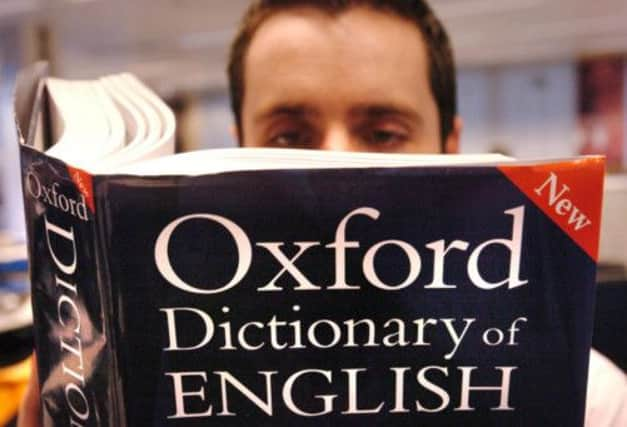Scotland on Sunday coined ‘dad dancing’ now in OED


And the credit for that goes to Scotland on Sunday, which according to OED compilers, was the first publication in the world to use the phrase.
Dad dancing, which the dictionary defines as being “an awkward, unfashionable, or unrestrained style of dancing to pop music, as characteristically performed by middle-aged or older men”, has become a global phenomenon practised by the likes of Barack Obama, Prince Charles and David Cameron – with websites, bands and even dance projects dedicated to the cringeworthy fatherly shoe-shuffle.
Advertisement
Hide AdAdvertisement
Hide AdThe OED, which said it had chosen the phrase to enter the dictionary because of its lasting popularity in contemporary culture, said dad dancing first appeared in print in this newspaper on 20 October, 1996, in an article about a nightclub for mature clubbers in Edinburgh by reporter Geraldine Murray.
Fiona McPherson, senior editor at the Oxford English Dictionary, said: “We tried as far as we could to pinpoint the first example of where dad dancing was used in print, and this was it. The journalist who used it probably wouldn’t have realised that it would take off as such a phenomenon back then, but as we now have more than ten years’ worth of examples of dad dancing being commonly used we felt it was time to include it.”
She added: “Dad dancing is something we all recognise. If you say the phrase you instantly get an image in your head of exactly what it means.”
Murray, who wrote the Scotland on Sunday article, said: “It was just a phrase that was going round at the time and it seemed appropriate to use it. It was that idea of that awful thing that happens to a man when he becomes a parent and therefore becomes totally incapable of doing anything other than awkward shuffling about on the dance floor.
“The fact that this endearingly clumsy phenomenon not only still exists but has grown so much since I first used it is impressive really – it stands as a bastion to being terribly awkward.”
Dance critic Kelly Apter said that far from being the manifestation of an irresistible urge to make one’s children cringe, dad dancing was an inevitable result of men’s shyness on the dance floor. “Women dance with each other from an early age, so it feels natural and fun – boys less so. So as they get older, the idea of men just ‘letting go’ on the dance floor gets increasingly hard, leading to some pretty stilted, uncomfortable-looking moves that only compound the idea that dads can’t dance,” she said.
“And, of course, as soon as you stick a label on something, it gets worse. We all, men and women, mums and dads, need to get back some of that free spirit we displayed on the dance floor in our teens and early 20s.”
Nowadays dad dancing is a global phenomenon recognised the world over at weddings, work nights out and other social occasions. Political leaders are particularly prone to it: Barack Obama, George Bush, Boris Johnson and David Cameron have all been spotted indulging in a few badly thrown shapes. There is a rock band that rejoices under the name Groovy Dad Dancing, while dad dancing has its own Tumblr website devoted to particularly flamboyant examples of the genre. The UK even held National Dad Dancing Championships in 2004.
Advertisement
Hide AdAdvertisement
Hide AdIn 2009, research was published that suggested dad dancing was in fact an evolutionary quirk that meant ageing males would repel the attention of young women, leaving the field clear for men at their sexual peak.
“The message their dancing sends out is ‘Stay away, I’m not fertile’,” said Dr Peter Lovatt, a psychologist at the University of Hertfordshire who compared the dancing styles and confidence levels of nearly 14,000 people.
His research showed that men between the ages of 35 and 60 typically attempted complex moves with limited co-ordination.
“It would seem completely unsurprising to me that since middle-aged men have passed their natural reproductive age, and probably have a family already, evolution would act to ensure they are no longer attractive to 18-year-old girls,” Dr Lovatt said. “It’s like an apple that is going brown – you want a fresh green one instead.”
Rosie Heafford, who runs the Dad Dancing project in collaboration with two other dancers – a dance performance that involves her and her father, as well as two other professional dancers and their dads – said she had mixed feelings about the phrase’s inclusion in the dictionary.
“In a way, the definition of dad dancing used by the dictionary is a shame as it’s going to characterise the stereotypes of men dancing badly even further,” she said.
“We’re trying to reclaim dad dancing – we’re looking at the embarrassment of dad dancing that every teenager goes through and celebrating it as being a really different way of moving. Dad dancing is right on that line of cringe and we want to celebrate the cringe.”
Twitter: @emmacowing